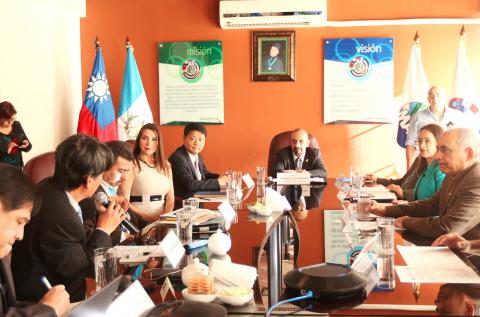With its five decades of experience, Taiwan is helping Central and South American countries fight fusarium wilt in bananas, and was involved in a video conference earlier this month attended by nearly 500 experts from 28 nations, the International Cooperation and Development Fund (ICDF) said yesterday.
The banana trade is vital to the economies of Central and South American countries, and the disease poses a great threat to their banana production, ICDF Deputy Secretary-General Alex Shyy (史立軍) told a news briefing at the Ministry of Foreign Affairs in Taipei.
The fungal disease, which devastates plants’ vascular systems, could be described as the “cancer” of bananas and spores can survive in soil for decades, a report by the Taiwan Banana Research Institute said.

Photo courtesy of the International Cooperation and Development Fund
Taiwan first identified the disease in bananas in Pingtung County in 1967, the institute said, adding that it destroyed nearly 4,000 hectares of banana trees in Pingtung and Kaohsiung in a few years, dealing a severe blow to the nation’s banana exports.
The disease was linked to soil degradation caused by the use of chemical fertilizers, the report said.
After Colombia last year reported its first case of the disease, Central America’s International Regional Organization for Plant and Animal Health (OIRSA) asked to work with the ICDF again, after the two fought citrus greening disease together, Shyy said.
Taiwan has an edge in fighting fusarium wilt because of certain disease-resistant banana strains developed by the institute, as well as research and testing techniques developed by National Taiwan University (NTU), he said.
Institute director Chao Chih-Ping (趙治平), NTU plant pathology professor Hung Ting-hsuan (洪挺軒) and OIRSA members joined the ICDF on a trip to inspect banana farms in Guatemala, Belize and Honduras from Feb. 2 to Feb. 14, Shyy said.
A video conference at OIRSA’s office in Guatemala on Feb. 5 also attracted more than 500 experts from 28 nations, including Colombia and Ecuador, as well as Caribbean countries, he said.
When it comes to sustainable banana production, the nation can proudly say: “Taiwan can help,” Shyy added.
In related news, the agency is helping the Marshall Islands employ hydroponics to improve its self-sufficiency with regard to food, despite having infertile soil and inclement weather conditions, Shyy said.

MAKING WAVES: China’s maritime militia could become a nontraditional threat in war, clogging up shipping lanes to prevent US or Japanese intervention, a report said About 1,900 Chinese ships flying flags of convenience and fishing vessels that participated in China’s military exercises around Taiwan last month and in January last year have been listed for monitoring, Coast Guard Administration (CGA) Deputy Director-General Hsieh Ching-chin (謝慶欽) said yesterday. Following amendments to the Commercial Port Act (商港法) and the Law of Ships (船舶法) last month, the CGA can designate possible berthing areas or deny ports of call for vessels suspected of loitering around areas where undersea cables can be accessed, Oceans Affairs Council Minister Kuan Bi-ling (管碧玲) said. The list of suspected ships, originally 300, had risen to about

DAREDEVIL: Honnold said it had always been a dream of his to climb Taipei 101, while a Netflix producer said the skyscraper was ‘a real icon of this country’ US climber Alex Honnold yesterday took on Taiwan’s tallest building, becoming the first person to scale Taipei 101 without a rope, harness or safety net. Hundreds of spectators gathered at the base of the 101-story skyscraper to watch Honnold, 40, embark on his daredevil feat, which was also broadcast live on Netflix. Dressed in a red T-shirt and yellow custom-made climbing shoes, Honnold swiftly moved up the southeast face of the glass and steel building. At one point, he stepped onto a platform midway up to wave down at fans and onlookers who were taking photos. People watching from inside

Japan’s strategic alliance with the US would collapse if Tokyo were to turn away from a conflict in Taiwan, Japanese Prime Minister Sanae Takaichi said yesterday, but distanced herself from previous comments that suggested a possible military response in such an event. Takaichi expressed her latest views on a nationally broadcast TV program late on Monday, where an opposition party leader criticized her for igniting tensions with China with the earlier remarks. Ties between Japan and China have sunk to the worst level in years after Takaichi said in November that a hypothetical Chinese attack on Taiwan could bring about a Japanese

The WHO ignored early COVID-19 warnings from Taiwan, US Deputy Secretary of Health and Human Services Jim O’Neill said on Friday, as part of justification for Washington withdrawing from the global health body. US Secretary of State Marco Rubio on Thursday said that the US was pulling out of the UN agency, as it failed to fulfill its responsibilities during the COVID-19 pandemic. The WHO “ignored early COVID warnings from Taiwan in 2019 by pretending Taiwan did not exist, O’Neill wrote on X on Friday, Taiwan time. “It ignored rigorous science and promoted lockdowns.” The US will “continue international coordination on infectious